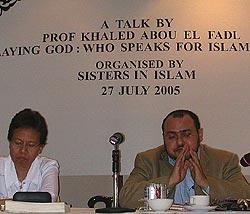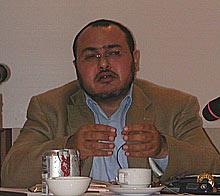If Islamic discourse is monopolised by male chauvinists, its because progressive Muslim women have abandoned their obligation to learn the necessary disciplines, said prominent scholar and advocate of women's rights.
 Speaking at a discussion in Kuala Lumpur yesterday, Islamic jurist and law professor Khaled Abou El Fadl told local Muslim women's group Sisters in Islam (SIS) to stop tussling with male chauvinist religious scholars in order to speak for Islam.
Speaking at a discussion in Kuala Lumpur yesterday, Islamic jurist and law professor Khaled Abou El Fadl told local Muslim women's group Sisters in Islam (SIS) to stop tussling with male chauvinist religious scholars in order to speak for Islam.
The established scholars hold an apparent monopoly over Islamic discourse only because progressive Muslim women have abandoned the Islamic learning disciplines and other requisite fields of knowledge, he said.
While it was the height of impertinence for anybody, including male chauvinists, to claim to speak on God's behalf, it was also misguided for others to issue declarations about Islam without having mastered and exercised the requisite knowledge and training, he added.
"Those who want to go beyond personal piety and become authoritative sources of authority for the community ... there is no alternative to learning, rigorous and thorough learning.
"We do not want to make the same mistake that the puritans and the fundamentalists commit. That is, to go to Saudi Arabia to study for a couple of years and then to come back ready to represent God," he told the closed-door discussion.
Entitled Playing God: Who speaks for Islam Today? , the discussion was organised by SIS and attended by some 25 people.
Khaled said SIS can begin to counter the conservatives' monopoly by helping to raise the next generation of women trained and qualified in Islamic jurisprudence and other disciplines who would be able to present alternative yet authoritative versions of God's will.
Khaled, who holds degrees from Yale University, University of Pennsylvania and Princeton University, has also received formal training in Islamic jurisprudence in Egypt and Kuwait.
He teaches at the University of California School of Law and has written extensively on the themes of morality and humanity, with much of his written focus on issues related to women.
Danger of misrepresentation
 "To say, 'Well, I can interpret God's will from a translated copy of the Quran, that's enough. I'll just read the translated Quran and I'll decide what God wants. I'd consider that a violation of diligence, comprehensiveness, probably self-restraint, and probably reasonableness as well," he said.
"To say, 'Well, I can interpret God's will from a translated copy of the Quran, that's enough. I'll just read the translated Quran and I'll decide what God wants. I'd consider that a violation of diligence, comprehensiveness, probably self-restraint, and probably reasonableness as well," he said.
Diligence, comprehensiveness, self-restraint, reasonableness and honesty were among the necessary qualities of the Islamic jurist in suggesting to society what is forbidden and what is allowed, he added.
Differentiating the role of jurists and other scholars from ordinary Muslims, Khaled said the latter should be preoccupied with purifying themselves by nurturing a personal relationship with God.
"For the average Muslim, the usual Muslim, they are not to pretend to be teachers. They are to be workers, immersed in the remembrance of Allah," he added.
After developing such a relationship with and awareness of God, it was a matter of natural intuition to know whether something was right or wrong, and "no half-learned male chauvinist can lie to you about your Creator. You know your Beloved intuitively."
Khaled said in issuing declarations to society at large about Islam without a comprehensive and systematic consideration of all the evidences, posed the danger of "transgressing against God" by wrongly declaring something forbidden when it is in fact allowed, or vice-versa.
The other danger lay in "the misrepresentation of the legitimate Islamic discourse, he added.
"This job of becoming a jurist is not a glamorous one. Your job is to spend years learning so that you are available to consult, to get consultation, if people seek your opinion," he said.
Give scholarships
In response to protestations from the floor that professional women and others occupied in other pursuits do not have time to undergo years of rigorous learning and training, Khaled said that was precisely the main reason the 'chauvinists' monopolised Islamic discourse.
"Muslim women had completely neglected the social obligation (of learning Islamic disciplines)," said Khaled, who compared the present situation with the past, where Islamic history recorded the attainments of more than 4,800 female Islamic jurists.
"If I was in a position such as SIS, I would fund scholarships for women to go and train in Islamic jurisprudence and other disciplines," he added.
In response to comments from another participant that Islamic practices and teachings included some that were barbaric by Western standards, Khaled said Muslim women need not bond themselves to standards set by the West.
"If you want to make the Western standard of barbarity, then that's fine, that's a decision that Muslims would have to make," he said.
"(However,) We are quick to rely on fashionable ideas (of feminism) from Europe. It's due time that we liberate our psychologies from the cultural experience," he added.

